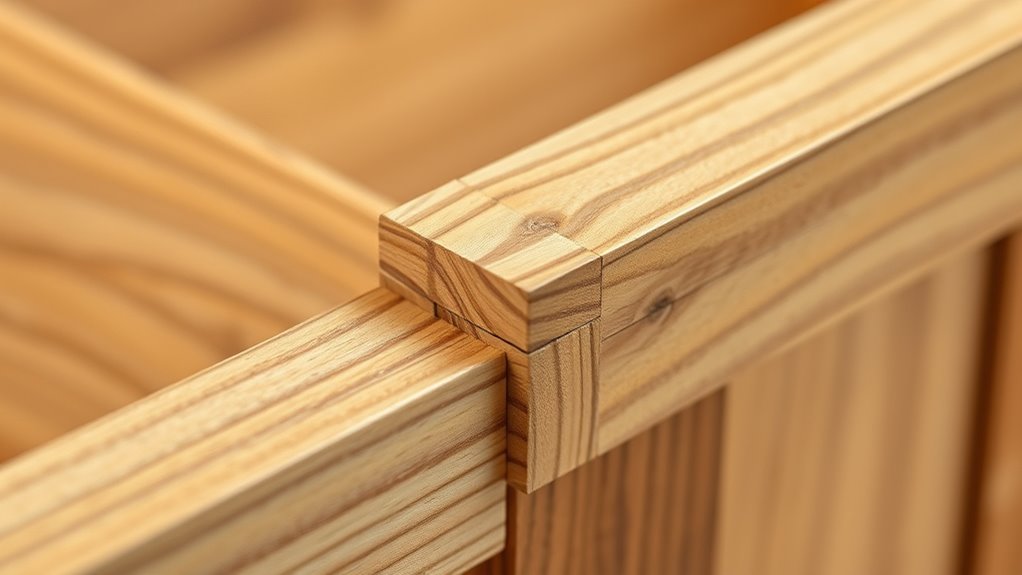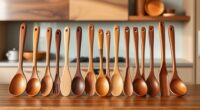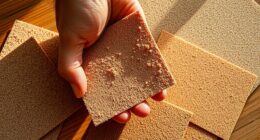If you’re aiming for expert craftsmanship and durability, choosing the right mortise and tenon joints is essential. I recommend high-quality tools like the Trend Mortise and Tenon Jig, OSKOOL’s adjustable jig, and the Kreg MortiseMate for precise, strong joints. Routers, chisels, and dedicated mortising machines also enhance accuracy. Each tool has strengths suited for specific projects, and exploring these options can take your woodworking to the next level. Keep going, and you’ll discover even more ways to perfect your joints.
Key Takeaways
- High-quality mortising and tenoning tools like Trend, OSKOOL, and Kreg ensure precise, durable joints suitable for expert craftsmanship.
- Material selection, such as certified beechwood or oak, enhances joint strength and longevity.
- Proper setup, adjustment, and alignment are crucial for achieving tight, professional-grade fits.
- Compatibility with various router bits and drill press attachments allows for versatile, precise joinery techniques.
- Investing in durable, well-designed jigs and tools offers cost-effective solutions for superior, long-lasting mortise and tenon joints.
Trend Mortise and Tenon Jig for Furniture Joints
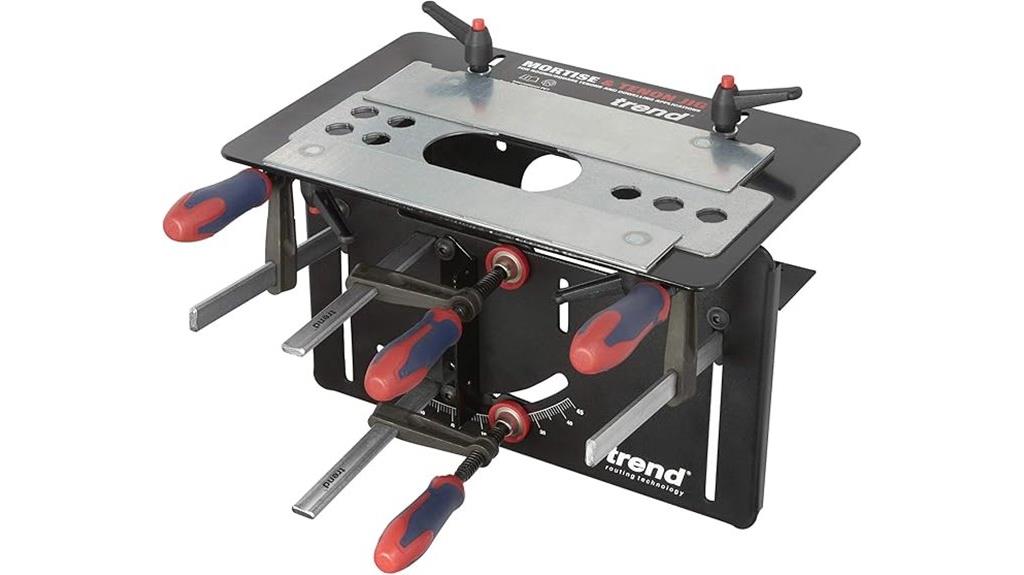
The Trend Mortise and Tenon Jig is an excellent choice for woodworkers who need precise, versatile joints for furniture and cabinetry. Made of steel, it supports five common mortise and tenon sizes, accommodating materials from 1/2 to 1 7/8 inches thick and up to 3 1/2 inches wide. The jig allows for quick adjustments with a setup bar and clamps, and its rotating main plate and angle bar enable angled and compound cuts from -10° to 45°. While it excels in smaller projects, some users find setup complex, and hardware quality can vary. Overall, it’s a reliable tool for achieving accurate joints with a router.
Best For: experienced woodworkers seeking precise, versatile mortise and tenon joints for furniture and cabinetry projects.
Pros:
- Supports multiple mortise and tenon sizes and adjustable angles for versatile joint design
- Made of durable steel with quick adjustment features like a setup bar and clamps
- Suitable for cutting thick materials up to 1 7/8 inches, accommodating various project sizes
Cons:
- Setup can be complex and may require trial and error, especially for angled cuts
- Hardware quality and guide bushing play can vary, affecting cut precision
- Limited suitability for larger or heavily angled stock without modifications or additional tools
OSKOOL Mortise and Tenon Jig for Cabinet, Chair, and Table Construction
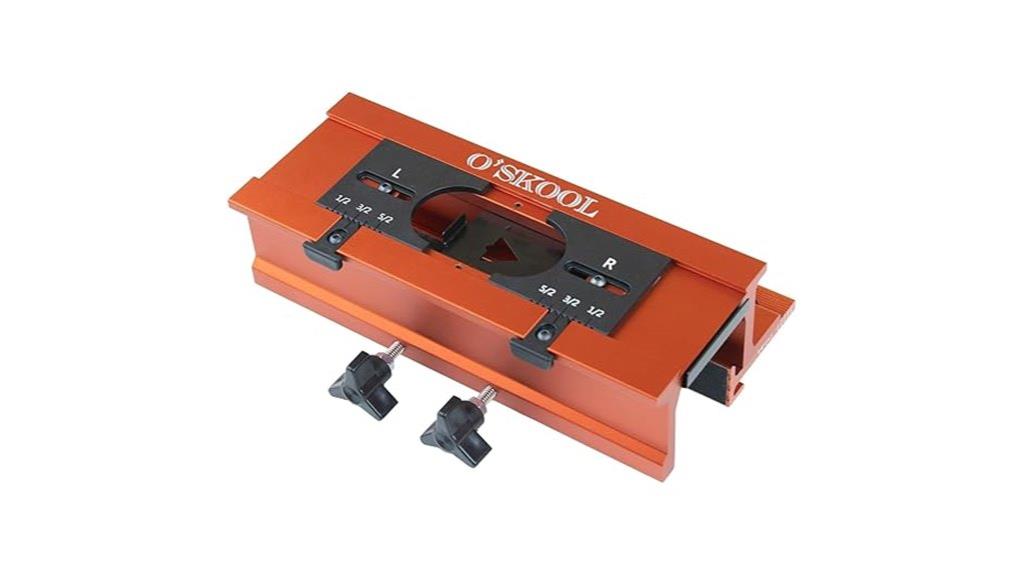
Are you looking for a reliable way to create precise mortise and tenon joints for your woodworking projects? The OSKOOL Mortise and Tenon Jig is an excellent choice for cabinets, chairs, and tables. It uses a plunge router to produce fully aligned mortises and tenons from 3/4 to 3-1/8 inches long, with widths of 1/4, 3/8, or 1/2 inch. Made from durable anodized aluminum, it’s easy to set up and guarantees consistent, square cuts. The jig offers versatility for various stock thicknesses and joint types, making it ideal for both professional craft and hobbyist woodworking. Proper clamping and setup are key to perfect results.
Best For: woodworking enthusiasts and professionals seeking precise, repeatable mortise and tenon joints for cabinets, chairs, and tables.
Pros:
- Solid anodized aluminum construction ensures durability and high-quality machining.
- Easy setup and assembly, with consistent, square cuts for repeatability.
- Versatile for various joint lengths, widths, and stock thicknesses, suitable for different projects.
Cons:
- Limited to 1/4-inch wide mortises out of the box, requiring additional bits for larger sizes.
- Some users experience fit issues with template guides or require extra clamping for stability.
- Dust messiness and the need for careful handling of plastic parts and router compatibility.
Kreg MortiseMate Loose Tenon Jig for Woodworking
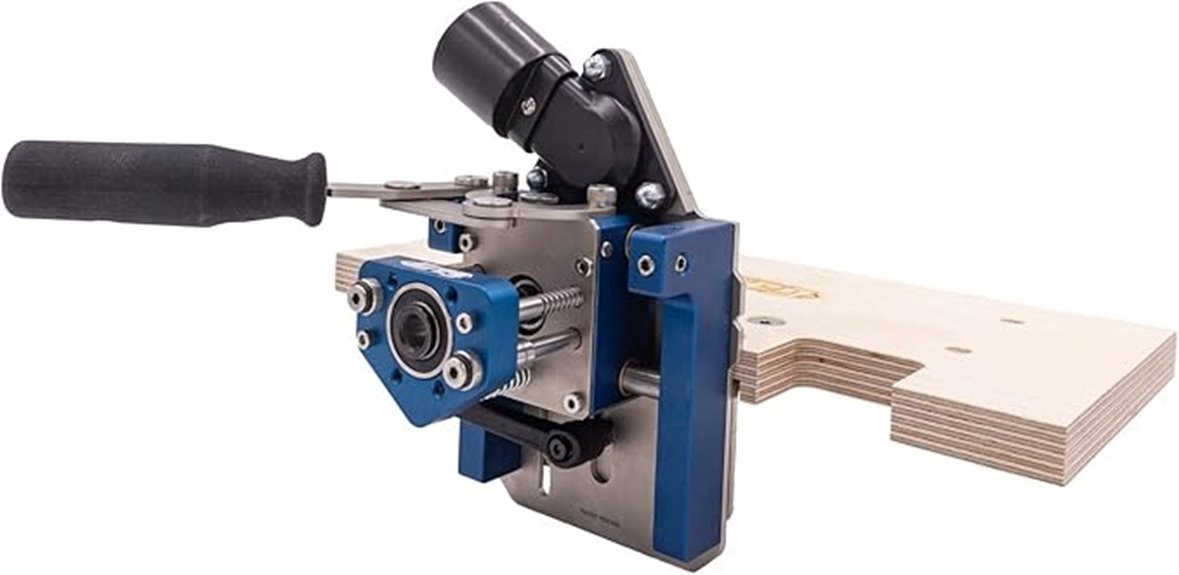
For woodworkers seeking precise mortise and loose tenon joints, the Kreg MortiseMate Loose Tenon Jig stands out as an excellent choice. It’s a premium drill jig that handles workpieces from 1/2 to 1 1/2 inches thick, featuring an auto-indexing step-down mechanism for accurate depth control. The integrated mini work surface and trigger clamps allow quick, secure setup, while micro adjustments and laser-etched markings ensure consistent mortise widths. Though construction can feel a bit flimsy and requires practice, it delivers predictable, repeatable cuts ideal for loose tenon joinery. Overall, it’s a versatile, reliable tool from Kreg, perfect for those seeking high-quality, precise joinery.
Best For: woodworkers seeking precise, repeatable mortise and loose tenon joints for projects involving workpieces 1/2 to 1 1/2 inches thick.
Pros:
- Delivers accurate, repeatable cuts with micro adjustments and laser-etched markings
- Features an integrated mini work surface and trigger clamps for quick, secure setup
- Well-made from a reputable brand, offering reliable performance for occasional use
Cons:
- Construction can feel flimsy, with metal parts prone to flexing
- Requires practice to master proper setup and technique for precise results
- Limited to workpieces up to 1.75 inches thick and may cause ergonomic discomfort during extended use
General Tools Mortise and Tenon Jig
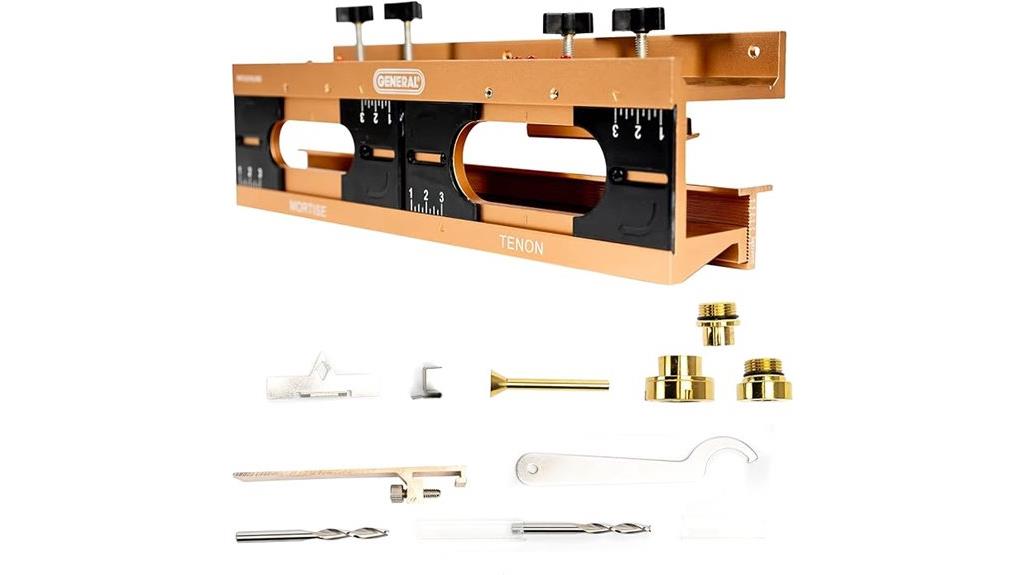
If you’re looking for an affordable, all-in-one jig to create precise mortise and tenon joints, the General Tools Mortise and Tenon Jig is an excellent choice. Made from durable aircraft-grade aluminum, it’s ready to use right out of the box and supports joints from 1/4 to 1 inch wide and 1 to 3 inches long. It easily clamps onto a workbench or a board in a vise, with integrated clamps and swing arms for wood alignment. Compatible with plunge routers, it includes essential accessories like bushings, a spiral bit, and a centering tool. Perfect for DIYers and artisans, it offers a versatile, portable solution for strong, accurate joints.
Best For: DIYers and artisans seeking an affordable, portable, and precise mortise and tenon jig for woodworking projects.
Pros:
- Constructed from durable aircraft-grade aluminum for stability and longevity
- Supports a wide range of joint sizes from 1/4 to 1 inch wide and 1 to 3 inches long
- Easy to clamp onto workbenches or boards, with integrated clamps and swing arms for alignment
Cons:
- Internal clamps can be difficult to tighten, especially for users with arthritis
- Clamps may not hold wood securely enough, leading to potential movement during cuts
- Depth adjustment and positioning mechanisms can be inconsistent, affecting precision and repeatability
Mortise and Tenon Jig Tools for Woodworking Routers
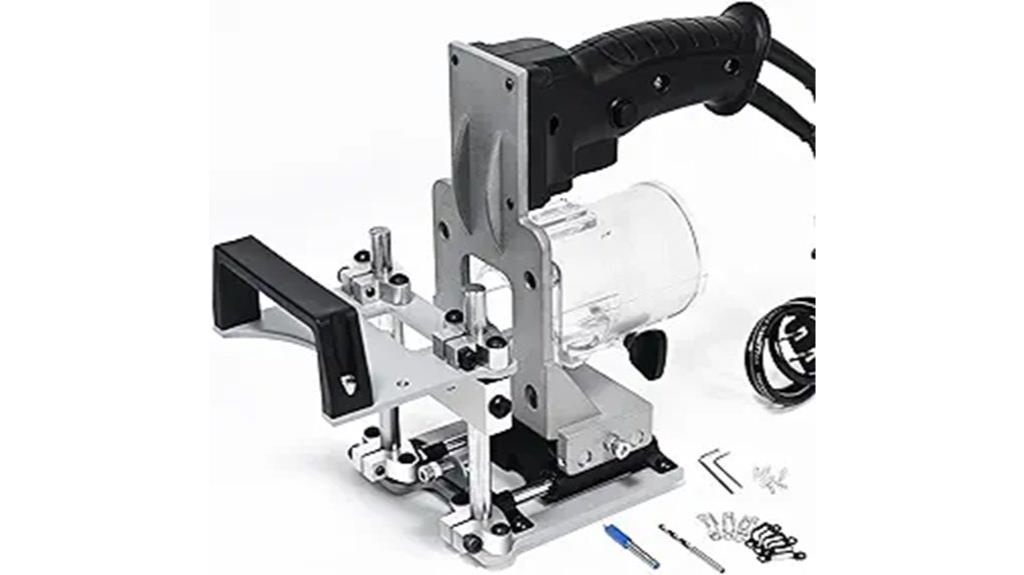
The Mortise and Tenon Jig tools for woodworking routers stand out as an affordable and versatile option for DIY enthusiasts and small-shop woodworkers seeking precise joinery. This 2-in-1 tool allows for high-precision mortise and tenon cuts, as well as efficient slotting trimming. Compatible with 65mm routers, it features a 3-axis guide rail for accurate adjustments, a transparent dust shield, and non-slip handles for safety. Weighing only 4.4 lbs, it’s plug-and-play and budget-friendly, costing around $100. While some users modify it for added stability, it provides a reliable, cost-effective way to produce snug-fitting joints without the complexity or expense of high-end equipment.
Best For: DIY woodworkers and small-shop enthusiasts seeking an affordable, versatile, and precise mortise and tenon jig for router-based joinery.
Pros:
- Cost-effective alternative to high-end tools like Festool Domino, offering good accuracy for the price.
- Easy to set up and operate with features like a transparent dust shield and adjustable 3-axis guide rail.
- Lightweight and plug-and-play design, making it suitable for quick, repetitive cuts without complex wiring or assembly.
Cons:
- Limited features such as lack of tilt function and dust collection, restricting some advanced woodworking operations.
- Build quality and components can be inconsistent, with reports of wiring issues, damaged parts, or missing accessories.
- May require modifications like additional clamps or longer screws for better stability and precision during use.
Dovetail Jigs for Woodworking
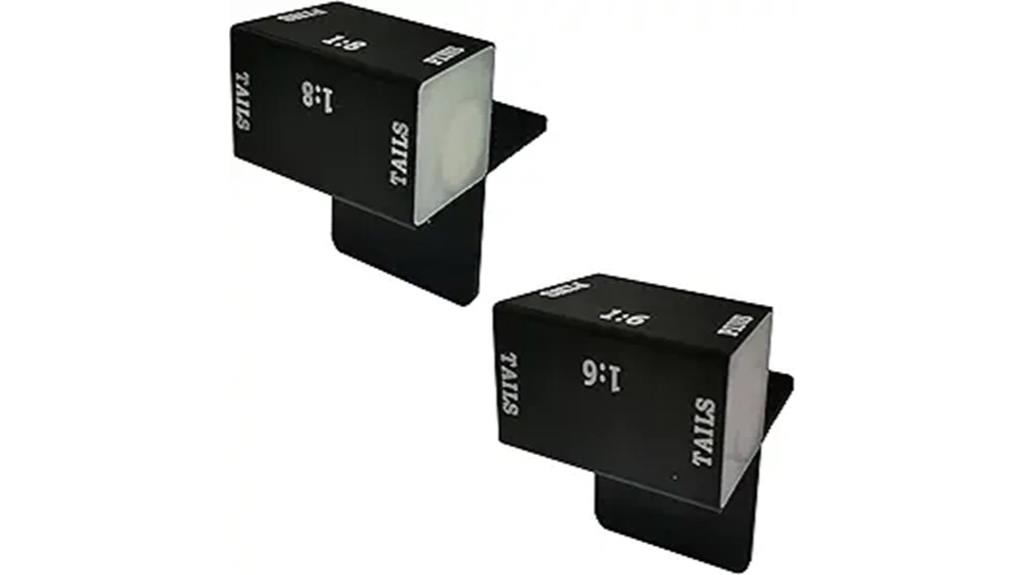
Dovetail jigs stand out as an essential tool for woodworkers aiming to create precise, professional-looking joints with minimal effort. I find them invaluable for marking and cutting dovetails, mortises, and tenons accurately. The jig’s durable stainless steel and brass design, combined with a magnetic base, keeps everything secure and easy to work with. Its adjustable fence lets me set different angles for various joints, ensuring consistency. Whether I’m a hobbyist or pro, I appreciate how lightweight and simple to operate it is. Plus, its versatility for multiple joinery types makes it a practical, cost-effective addition to my woodworking toolkit.
Best For: hobbyists and professional woodworkers seeking a reliable, versatile, and cost-effective tool for precise dovetail and joinery layout.
Pros:
- Accurate and easy to use, ensuring professional-quality joints
- Durable construction with stainless steel and brass materials
- Lightweight and portable, suitable for various project sizes
Cons:
- Weak magnets may not securely lock the jig in place during use
- Limited saw depth due to size restrictions
- Some users experience misalignment of metal parts affecting marking accuracy
YUEWO Mortising Attachment for Drill Press
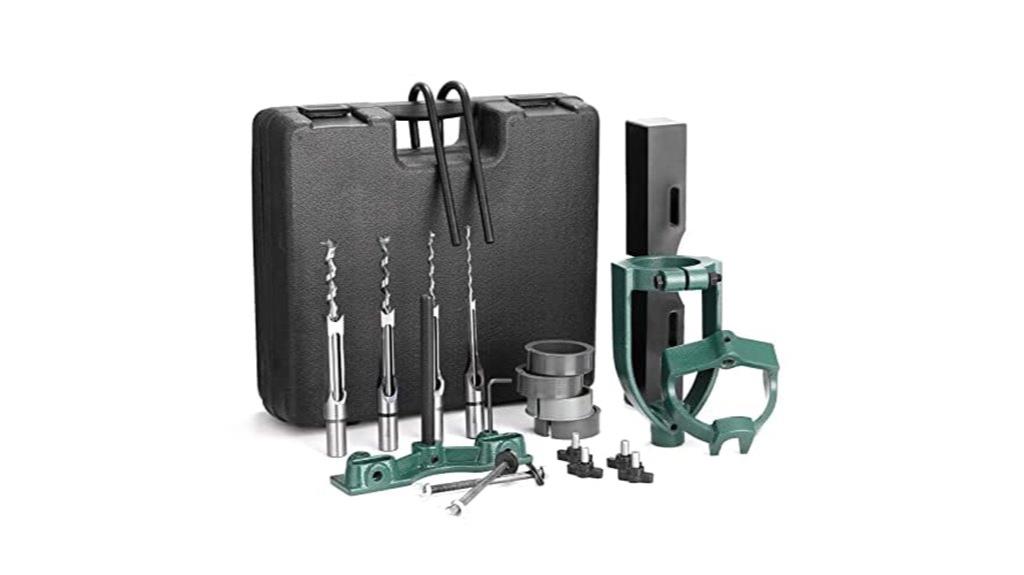
The YUEWO Mortising Attachment for Drill Press is an excellent choice for woodworkers looking to create precise, square-hole mortises without investing in a dedicated mortising machine. It converts your drill press into a capable mortising tool, ideal for joinery projects. The kit includes multiple chisels, bushings, and necessary accessories, making it versatile for different sizes. Made from durable cast iron and steel, it offers high performance and fast drilling. While installation can be tricky for beginners, with some adjustments and patience, it provides accurate mortises. Many users appreciate its value, quality, and ability to improve woodworking precision.
Best For: woodworkers and DIY enthusiasts seeking an affordable, versatile solution to create precise mortises using a standard drill press.
Pros:
- Converts a regular drill press into a capable mortising machine for accurate joinery
- Made from durable cast iron and steel, ensuring longevity and high performance
- Comes with a comprehensive kit including multiple chisels, bushings, and accessories
Cons:
- Installation can be challenging for beginners due to limited or unclear instructions
- Compatibility may require modifications or shims for smaller or non-standard drill press models
- Some users noted that plastic bushings may limit the lifespan of certain parts
Trend Mortise and Tenon Jig for Furniture Joints
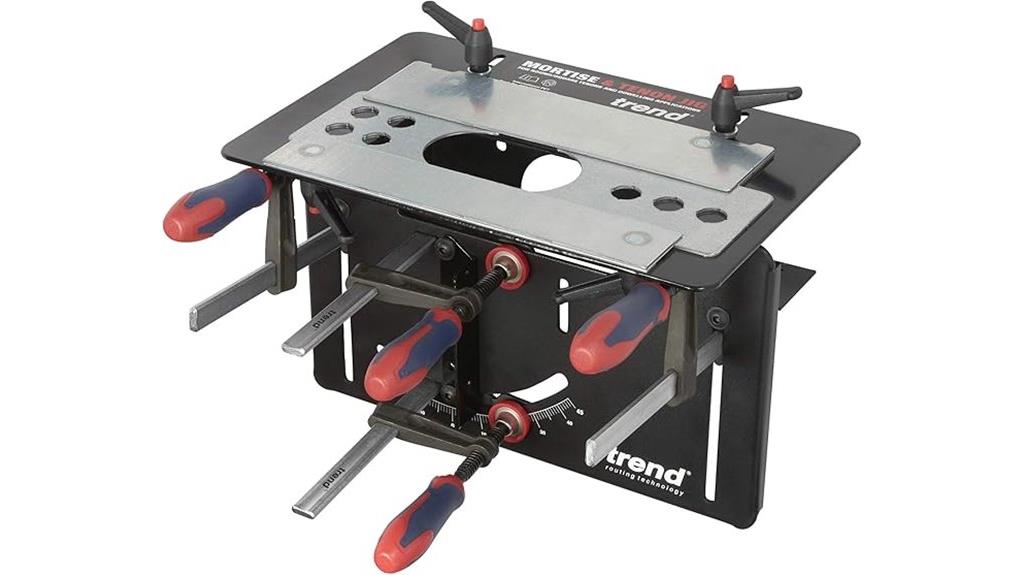
If you’re a woodworker seeking precise and versatile joints for furniture projects, the Trend Mortise and Tenon Jig stands out as an excellent choice. Made of steel plates and body, it supports five common mortise and tenon sizes, accommodating thick materials from 1/2 to 1 7/8 inches. The jig allows for adjustable angled cuts, including compound angles, and works with a plunge router for both mortise and tenon pieces. It features quick setup with a set-up bar and clamps, though some users find setup complex and hardware quality variable. Overall, it’s a versatile tool suited for experienced woodworkers aiming for durable, accurate joints.
Best For: experienced woodworkers and furniture makers seeking precise, versatile mortise and tenon joints for various projects.
Pros:
- Supports multiple mortise and tenon sizes for flexibility.
- Fully adjustable for compound and angled cuts.
- Made of durable steel construction for stability and long-term use.
Cons:
- Setup can be complex and may require trial and error.
- Hardware and guide bushings quality vary, sometimes affecting precision.
- Limited compatibility with non-US routers and larger or angled stock may be challenging.
4 Pcs Mortise Chisel Set with Square Hole Drill Bits
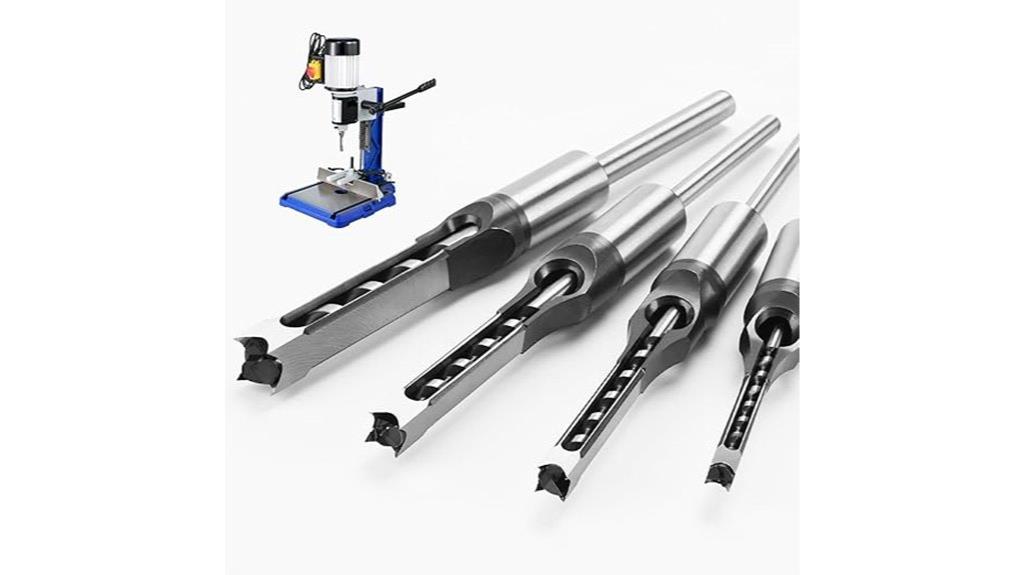
This 4-piece mortise chisel set with square hole drill bits is perfect for woodworkers who need precise, square mortise holes in their projects. Designed exclusively for mortising machines, it isn’t compatible with hand drills or drill presses without a mortising adapter (not included). The set includes drill bits in 1/4″, 5/16″, 3/8″, and 1/2″ sizes, ideal for various wood materials like solid wood, MDF, and plywood. Made of high-speed steel, these bits feature a U-shaped chip chute for easy wood chip removal, ensuring smooth, efficient cuts and durable performance.
Best For: woodworkers and carpenters seeking precise square mortise holes using mortising machines for various woodworking projects.
Pros:
- Compatible exclusively with mortising machines, ensuring optimal performance and safety.
- Made of durable high-speed steel with a U-shape chip chute for efficient wood chip removal.
- Comes in four convenient sizes (1/4″, 5/16″, 3/8″, 1/2″) suitable for different project needs.
Cons:
- Not compatible with hand drills or drill presses without a mortising adapter (not included).
- Limited to woodworking materials like solid wood, MDF, chipboard, and plywood; not suitable for other materials.
- Requires a mortising machine for use, which may not be available to all users.
VEVOR Tenon Cutter, 1.5 / 38 mm Diameter

For woodworking enthusiasts building log furniture, the VEVOR Tenon Cutter with a 1.5-inch (38 mm) diameter offers an efficient solution for creating precise tenons. It’s designed for logs up to 3 inches thick, making it ideal for beds, tables, and chairs. Made from durable die-cast aluminum with replaceable blades, it’s lightweight yet robust. Compatible with heavy-duty 1/2-inch drills, it delivers fast, burr-free cuts with smooth surfaces. Proper blade alignment and sufficient torque are essential for best results. While some users noted coating issues, adjusting and maintaining the tool guarantees clean, accurate tenons, perfect for both DIY projects and professional craftsmanship.
Best For: woodworking enthusiasts, DIYers, and log furniture builders seeking a durable, efficient tool for creating precise tenons on hardwood logs up to 3 inches thick.
Pros:
- Made from durable die-cast aluminum with replaceable steel blades for long-lasting use
- Capable of cutting hardwoods like oak and hickory with minimal sharpening
- Compatible with heavy-duty 1/2-inch drills for fast, burr-free cuts
Cons:
- Requires proper blade alignment and significant torque; weaker drills may struggle or cause binding
- Some users report issues with coating buildup or loose threaded holes affecting performance
- Initial setup and adjustments are necessary to achieve optimal results, which may be challenging for beginners
Trend 100pcs Beechwood Loose Tenons (6 x 40mm)
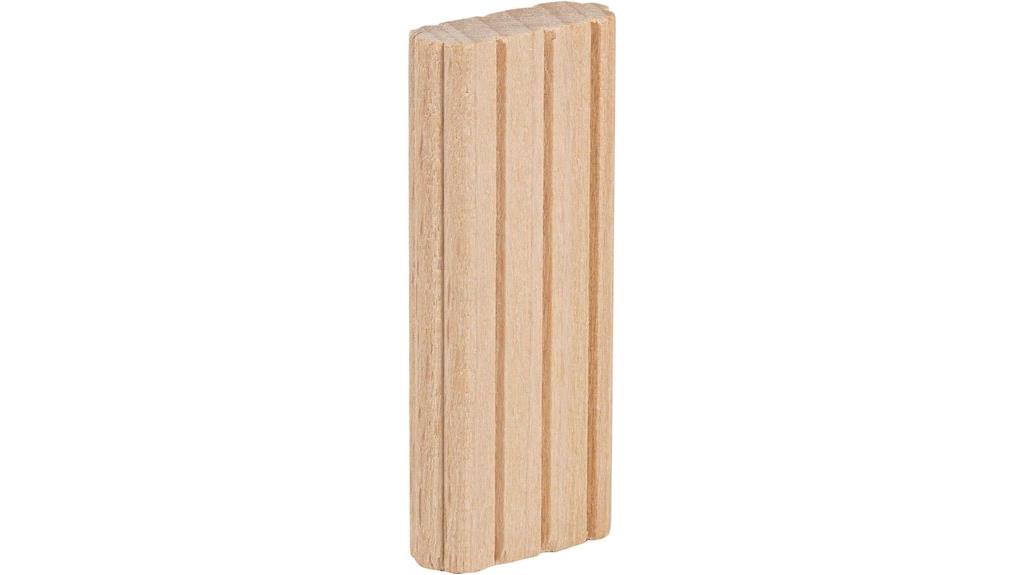
Trend’s 100pcs Beechwood Loose Tenons are an excellent choice for woodworkers seeking precise, strong joints in furniture framing and cabinetry. Made from certified, durable beechwood, these tenons feature full-length glue grooves that enhance adhesion and joint strength. Their rectangular shape measures approximately 0.24 x 0.79 x 1.57 inches, designed for compatibility with routers, mortice jigs, or Festool Domino systems. With 100 pieces per pack, they offer an economical, versatile solution for various joinery tasks. Though slightly looser than standard 1/4 inch mortises, they provide reliable performance and are easy to handle, making them ideal for both professional and DIY projects.
Best For: woodworkers and furniture makers seeking precise, strong, and versatile joinery solutions for cabinetry, framing, and general woodworking projects.
Pros:
- Made from durable, certified beechwood for strong and sustainable joints
- Full-length glue grooves enhance adhesion and joint security
- Compatible with routers, mortice jigs, and Festool Domino systems for professional results
Cons:
- Slightly looser fit than standard 1/4 inch mortises, which may require adjustments
- Limited to specific sizes and shapes, reducing flexibility for custom applications
- Customer ratings average 3.7 out of 5 stars, indicating some variability in performance
CMT 543.190.51 Mortise Chisel & Bit Set, 3/4-Inch Diameter, 3/4-Inch Shank

If you’re seeking a reliable tool for creating precise mortise and tenon joints, the CMT 543.190.51 Mortise Chisel & Bit Set is designed to meet those needs. Made from heavy-duty alloy steel with a 3/4-inch diameter and shank, it’s compatible with standard drill press attachments. The set features a straight flute bit with a flat point, ideal for accurate mortising in hardwoods like oak. While some users report initial rough edges requiring sharpening, many find it performs well after tuning. However, quality issues such as inconsistent fit or rough machining have been noted, so careful inspection before use is recommended.
Best For: woodworkers and DIY enthusiasts seeking an affordable, versatile mortise chisel and bit set for hardwood projects.
Pros:
- Made from heavy-duty alloy steel for durability and strength
- Compatible with standard drill press mortising attachments for versatility
- Suitable for precise mortising in hardwoods like oak after tuning
Cons:
- May require sharpening or polishing due to rough factory edges
- Inconsistent fit or machining quality reported by some users
- Bits can be too short or have variable shaft lengths, affecting usability
Tongue and Groove Router Bit Set of 2 Pieces
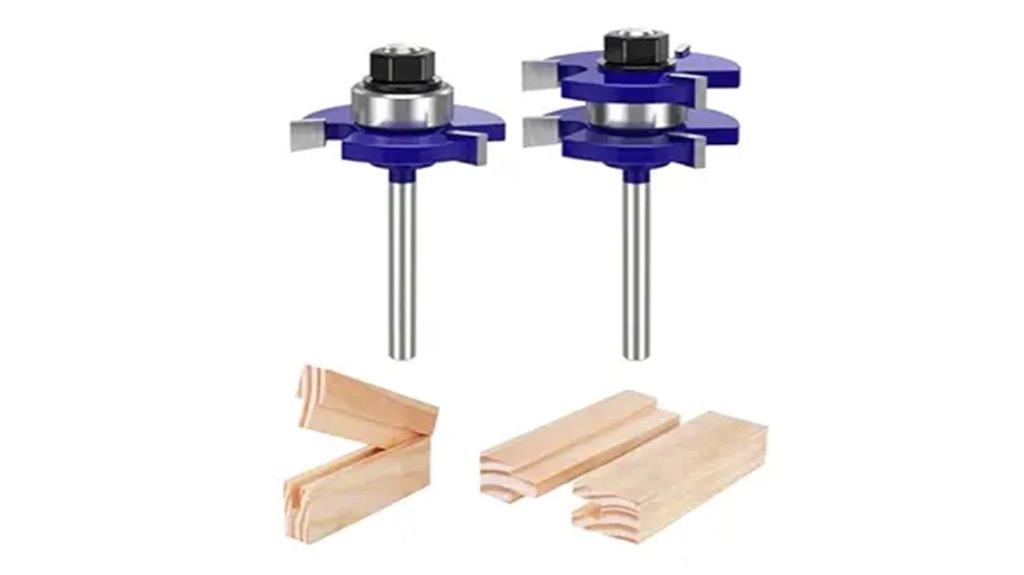
A Tongue and Groove Router Bit Set of 2 Pieces provides an affordable and efficient solution for woodworking enthusiasts looking to create precise tongue and groove joints. This set includes two 1/4-inch shank bits, packaged in a durable, full-color box with individual plastic containers for protection and reuse. The bits are made from alloy blades with hardened steel bodies, ensuring sharp, smooth cuts and long-lasting durability. Compatible with full-sized routers and shapers, these bits are ideal for working with wood, MDF, and plywood. They deliver clean joints, especially when set up correctly with proper measurement and slower router speeds, making them a reliable choice for DIY projects.
Best For: DIY woodworking enthusiasts and homeowners seeking an affordable, reliable set for creating precise tongue and groove joints in various wood projects.
Pros:
- Sharp alloy blades produce smooth, clean cuts with minimal tear-out.
- Well-packaged with individual plastic containers and a sturdy wooden case for easy storage and portability.
- Compatible with full-sized routers and shapers, making them versatile for different woodworking tasks.
Cons:
- Flimsy storage box may not provide long-term durability or protection.
- Slight excess play in assembled sets can require fine-tuning for perfect fit.
- Some users may experience initial difficulty with adjustments, needing careful setup for optimal results.
Mortising Machine Bench Drill Locator Set for Woodworking
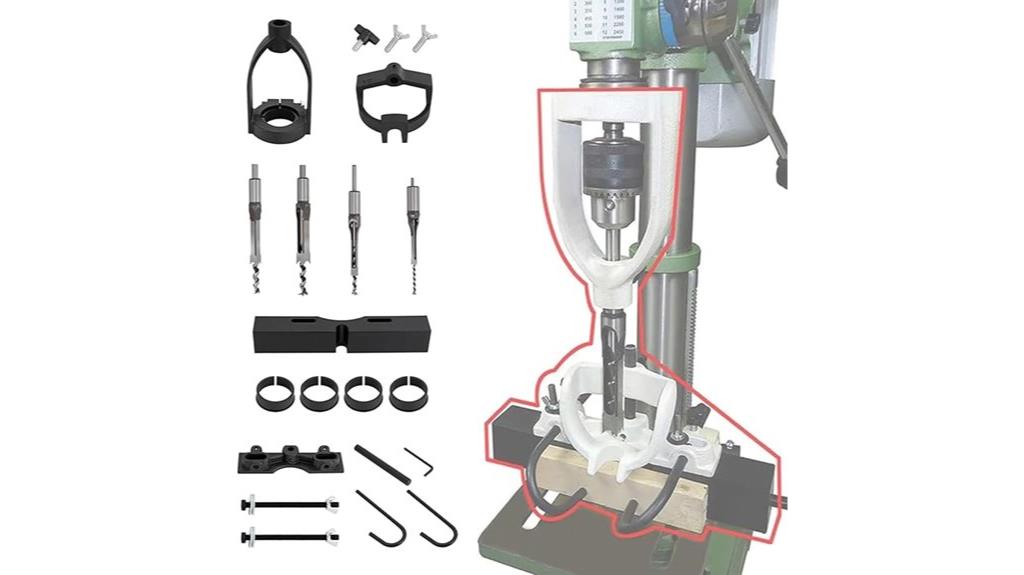
The Mortising Machine Bench Drill Locator Set is an ideal choice for woodworkers seeking high precision and efficiency in creating mortise and tenon joints. Crafted from durable materials like high-quality grey iron, steel, and plastic, these components resist wear and deformation, ensuring longevity. CNC-machined for accuracy, the tools securely mount on bench drills, delivering stable, precise cuts. The premium drills feature a chip removal design for clog-free operation, while the gear-driven handle reduces fatigue. With four drill sizes and compatible sleeves, the set offers versatility for various projects. Overall, it’s a cost-effective solution that simplifies mortising, making professional results accessible for both hobbyists and experts.
Best For: both professional woodworkers and hobbyists seeking precise, efficient, and durable mortising solutions for woodworking projects.
Pros:
- Crafted from high-quality materials like grey iron, steel, and durable plastic for long-lasting use.
- CNC-machined for high precision, ensuring accurate and stable cuts.
- Features a chip removal design and gear-driven handle to enhance cutting efficiency and reduce fatigue.
Cons:
- May require compatibility checks with specific bench drill sizes for optimal use.
- The set includes only four drill sizes, which might not cover all specialized needs.
- Assembly and operation might be complex for complete beginners without prior experience.
DOITOOL Square Drill Chisel for Mortiser, 53mm Drill Sleeve
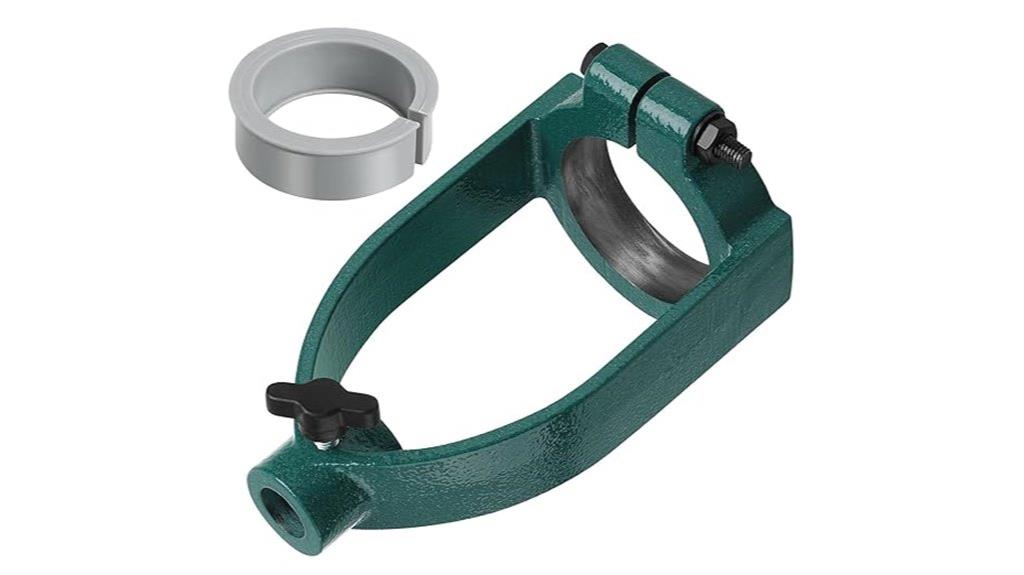
The DOITOOL Square Drill Chisel with a 53mm drill sleeve offers an excellent solution for woodworkers looking to achieve precise mortise and tenon joints. Designed to convert a standard drill press into a mortising tool, it’s made of durable iron for strength and stability. While easy to install and remove, fitment can vary—some users report perfect compatibility, others need to modify or add spacers to guarantee a snug fit. It’s ideal for woodworking projects like cabinets, window sashes, and furniture. However, verifying size compatibility before purchase is essential, as improper fit can lead to wobbling or safety concerns.
Best For: woodworkers and furniture makers seeking an affordable and durable accessory to convert a standard drill press into a precise mortising machine.
Pros:
- Made of durable iron for strength and stability
- Easy to install and remove, facilitating quick setup
- Suitable for various woodworking projects like cabinets and furniture
Cons:
- Fitment varies, with some users experiencing compatibility issues
- May require modifications or spacers for proper fit
- Not compatible with all drill presses; verify dimensions before purchasing
Factors to Consider When Choosing a Mortise and Tenon Joint

When selecting a mortise and tenon joint, I focus on material compatibility and strength to guarantee a sturdy connection. I also consider the joint size and fit for ease of assembly and long-term durability. Additionally, I evaluate tool compatibility and setup to make the process efficient and effective.
Material Compatibility and Strength
Choosing the right materials for a mortise and tenon joint requires careful attention to their compatibility in hardness and density, as this directly impacts the bond strength and overall durability. I always select high-quality, durable woods like beech, oak, or maple, which resist wear and deformation under stress. It’s vital to verify that the moisture content is appropriate, preventing issues like loosening or cracking caused by expansion or contraction after assembly. I also consider the material’s tensile and compressive strengths to ensure the joint can support its intended load. Additionally, matching the grain orientation and structure enhances glue adhesion and mechanical interlock, boosting the joint’s overall strength. Proper material compatibility is fundamental to creating a long-lasting, reliable mortise and tenon connection.
Joint Size and Fit
How do you guarantee a mortise and tenon joint fits perfectly? It starts with sizing the joint carefully. The mortise and tenon should fit snugly with only a few thousandths of an inch clearance—tight enough to prevent gaps but not so tight it’s impossible to assemble. Match the joint dimensions to the thickness and width of your material to ensure both strength and visual harmony. Verify that the tenon width matches the mortise precisely, especially when using different bit sizes or jigs. Be mindful of your tools’ size limitations to avoid attempting joints beyond their capacity. During assembly, test fit the joint first, making adjustments if needed before final gluing or fastening. Proper sizing is key to a durable, professional-quality joint.
Ease of Assembly
The ease of assembling a mortise and tenon joint largely depends on the precision and adjustability of the tools and jigs you use. Well-designed jigs have clear measurement guides, quick-lock mechanisms, and minimal setup steps, making assembly faster and less frustrating. Proper clamping and stable workpiece positioning are essential, as movement can complicate fitting. Using compatible router bits and guide bushes that match the joint dimensions helps streamline the process, reducing manual adjustments. For beginners, the learning curve can be steep, but practice and clear instructions markedly improve ease of assembly. Ultimately, selecting the right tools and ensuring proper setup can make the process smoother, more accurate, and less time-consuming, resulting in a better-quality joint with less effort.
Tool Compatibility and Setup
Selecting the right mortise and tenon jig depends on ensuring compatibility with your tools. First, verify that the jig’s guide bushings or sleeves match your router or drill press in size and type, preventing fit issues. Make sure the jig can handle your workpiece’s thickness and width; some support materials from 1/2 inch to over 1 7/8 inches thick. Check if the setup mechanisms, like adjustable plates or angle bars, allow precise alignment and locking at your desired angles, including compound cuts. Also, confirm whether the guide bushings are compatible with your specific equipment, especially if you use non-US or specialized models. *Finally*, consider how features like set-up bars, clamps, and locking mechanisms impact ease of use and repeatability for your projects.
Durability and Longevity
Durability and longevity of a mortise and tenon joint largely depend on choosing high-quality materials and ensuring a precise fit. Using hardwoods or reinforced composites creates a strong foundation that resists wear and environmental stresses. A tight-fitting joint minimizes movement, reducing wear over time and enhancing durability. The choice of adhesive or mechanical fasteners also plays a vital role; selecting the right options can protect against moisture, temperature fluctuations, and other elements. Reinforcements like dowels, pins, or wedges can boost the joint’s load capacity and resistance to shear and tensile stresses. Finally, regular maintenance—cleaning, inspecting, and re-gluing when needed—helps prevent deterioration and keeps the joint secure for years to come. Proper material selection and care are key to maximizing the lifespan of your mortise and tenon joints.
Precision and Accuracy
Achieving precision and accuracy in mortise and tenon joints hinges on careful measurements and proper tool setup. I always start by ensuring my jig is calibrated correctly, with precise alignment to guarantee consistent cuts. Using high-quality guide bushings and sharp bits minimizes play and wobble, which is essential for tight-fitting joints. When producing multiple joints, I double-check each setup to maintain uniformity across all pieces. Locking mechanisms and angle adjustments must be tested thoroughly to prevent movement during cutting, ensuring accuracy. Regular maintenance of my tools, like sharpening bits and tightening hardware, keeps everything performing at its best. This attention to detail helps me create mortise and tenon joints that are not only accurate but also fit perfectly, enhancing the overall craftsmanship.
Cost and Budget
Choosing the right mortise and tenon joint setup depends heavily on your budget and project needs. Tools and jigs range from affordable options around $20 to professional-grade setups over $200. Higher-priced tools typically offer better durability, precision, and ease of use, which can be worth the investment if you do frequent or high-quality woodworking. Budget options might lack advanced features or stability, possibly increasing your time and effort or requiring extra modifications. When planning your budget, remember to include accessories like guide bushings, router bits, or clamps, as these can add to the overall cost. Setting a clear budget helps you decide whether a basic jig suits your hobbyist projects or if a more expensive, professional system is necessary for demanding tasks.
Frequently Asked Questions
What Are the Key Differences Between Traditional and Modern Mortise and Tenon Joints?
You’re wondering about the differences between traditional and modern mortise and tenon joints. I find that traditional joints are handcrafted, often with hand tools, emphasizing craftsmanship and authenticity. Modern joints, however, incorporate machine techniques, making them quicker and more consistent, yet sometimes less characterful. While traditional joints excel in aesthetics and historical value, modern ones prioritize efficiency and strength, offering a practical balance for today’s woodworking needs.
How Do Humidity and Temperature Affect the Durability of These Joints?
Humidity and temperature can really impact the durability of mortise and tenon joints. I’ve seen that high humidity causes wood to swell, which can loosen the joints over time, while dry conditions make wood shrink and create gaps or cracks. Temperature fluctuations accelerate these effects. To guarantee longevity, I recommend controlling environmental conditions and choosing wood species resistant to moisture changes, helping your joints stay strong for years.
Can Mortise and Tenon Joints Be Reinforced With Adhesives or Fasteners?
It’s interesting how mortise and tenon joints can be reinforced with adhesives or fasteners, isn’t it? I often use wood glue for added strength, especially in high-stress areas, while nails or dowels can help align and secure the joint during assembly. These reinforcements don’t replace traditional craftsmanship but enhance durability, giving me confidence that my work will last, even under varying humidity and temperature conditions.
What Safety Precautions Should Be Taken When Using Mortising Machines?
When using mortising machines, safety is my top priority. I always wear eye protection and earplugs to guard against debris and noise. I make sure to keep my hands clear of the cutting area and secure the workpiece firmly. Before starting, I double-check all adjustments and make certain the machine’s guards are in place. Staying alert and following manufacturer instructions helps prevent accidents and keeps me safe during use.
Are There Specific Woods That Are Better Suited for Mortise and Tenon Construction?
Think of choosing wood for mortise and tenon joints like selecting the right dance partner. I prefer hardwoods like oak, maple, and cherry because they’re sturdy and hold joints well. Softwoods, like pine, can work but aren’t as durable for heavy use. I always consider the project’s purpose and load to pick the best wood—kind of like finding the perfect dance partner for a smooth performance.
Conclusion
In the world of woodworking, choosing the right mortise and tenon joint can truly elevate your craft. With the right tools and a keen eye for detail, you’ll find that even the most subtle improvements can make a big difference. Remember, patience and experimentation often lead to mastery. So, explore these options, trust your instincts, and enjoy the process of creating furniture that’s not only beautiful but built to last—your hands can do wonders.
